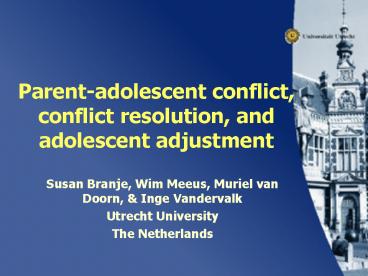Parentadolescent conflict, conflict resolution, and adolescent adjustment - PowerPoint PPT Presentation
1 / 15
Title:
Parentadolescent conflict, conflict resolution, and adolescent adjustment
Description:
Stepwise regression analyses. Age, sex. Conflict father ... Stepwise regressions as in wave 1, with w1 problem behavior as additional predictor in step 1 ... – PowerPoint PPT presentation
Number of Views:572
Avg rating:3.0/5.0
Title: Parentadolescent conflict, conflict resolution, and adolescent adjustment
1
Parent-adolescent conflict, conflict resolution,
and adolescent adjustment
- Susan Branje, Wim Meeus, Muriel van Doorn, Inge
Vandervalk - Utrecht University
- The Netherlands
2
Introduction
- Parent-adolescent conflicts
- promoting adolescent development of autonomy and
individuation - a risk for psychosocial adjustment and well-being
- Important for adolescents to learn to adequately
handle and resolve their conflicts
3
Previous studies
- Association of conflict and conflict resolution
with adolescents psychosocial adjustment - Conflict with both externalizing and
internalizing problems - Engagement with externalizing and internalizing
problems - Withdrawal with internalizing problems
4
Research question and hypotheses
- How are conflict and conflict resolution related
to behavioral and emotional adjustment problems? - Contemporary and over time
- Sex and age effects
- Which types of conflict resolution style can be
distinguished? - Does the link between parent-adolescent conflict
and adolescent behavioral and emotional problems
depend on adolescents conflict resolution style?
5
Method
- CONAMORE (CONflict And Management Of
- RElationships) 2001-2006 longitudinal study,
- Wave 1 and 2
- 1313 Dutch adolescent children
- 49 boys, 51 girls
- 921 early adolescents (age 12-13), 390 middle
adolescents (age 16-17) - 86 of Dutch origin
6
Measures
- Number of conflicts with father and mother
- Interpersonal Conflict Questionnaire (Laursen,
1993) - Conflict resolution with father and mother
- Conflict Resolution Style Inventory (Kurdek,
1994) - positive problem solving
- conflict engagement
- withdrawal
- compliance
- Exit
- Emotional behavioral adjustment
- depression (CDI Kovacs, 1981)
- anxiety (SCARED-R, Muris et al., 1998)
- aggression (Bjorqvist, 1992)
- delinquency (Rispens et al., 1996)
7
Resultsrelation of conflict and conflict
resolution to problems
- Wave 1
- Stepwise regression analyses
- Age, sex
- Conflict father mother
- Conflict resolution
- Conflict conflict resolution
- Wave 3
- Stepwise regressions as in wave 1, with w1
problem behavior as additional predictor in step
1
8
9
10
Cluster analyses 5 types of conflict resolution
styles
b b d a c
c c c d c
a a b a a
b b b b a
c c a c b
Medium Positive Engage Withdraw Low
11
Clusters and problem behavior
bbaaaa
aaaaaa
bbaaaa
aaaaaa
ccabbb
Medium Positive Engage Withdraw Low
12
Clusters and problem behavior
Conflict mother
Conflict father
aggression
.27/.30/.10/.32/.18
.25/.24/.25/.24/.13
delinquency
Conflict parents
depression
.10/.14/.34/ .14/.08
anxiety
.12/.17/.41/.22/.11
?2 (70)177.09, GFI.99, RSMEA .04
Medium/Positive/Engage/Withdraw/Low
13
Conclusion regressions
- Parent-adolescent conflicts are related to
behavioral and - emotional problems
- Conflict resolution
- Aggression withdrawal (), engagement (),
positive () - Delinquency positive (-), compliance (-)
- Depression positive (-), withdrawal (), exit
(-), compliance () - Anxiety engagement (), compliance (), exit
(-) - No mediation of conflict or conflict resolution
- Some moderating effects of conflict resolution
14
Conclusion types
- Relation between conflicts and adjustment depends
on adolescents conflict resolution style - conflict engagement
- more problem behaviors
- conflicts stronger related to emotional problems,
less strong to behavioral problems (aggression) - withdrawal
- Somewhat more conflicts but not stronger related
to problems than positive solving - positive conflict solving
- less problems and conflicts
15
- Thank you































